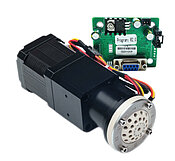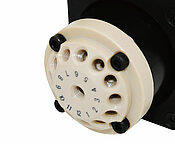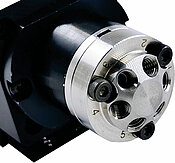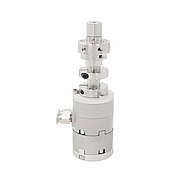Rotary shear valves - sample collection, sample loop injection, selection
Rotary Valves play a crucial role in optimizing fluid control and controlling sensitive samples in various life science applications. These valves are designed to handle liquids precisely, making them ideal for tasks where minimizing sample carryover is critical. Our rotary valves are available in various designs with very low internal volumes.
Product overview

Low pressure rotary shear valves multiport
- Channel sizes of 0.5mm, 1.0mm and 1.5mm
- Wetted materials: PEEK, UPE & ETFE
- Pressure range up to 10 bar
- Valve head configurations up to 29 ports

Medium pressure multiport rotary valves made of PEEK & 316 stainless steel
- Valve body materials: PEEK or 316 stainless steel
- Channel diameter: 1.0mm or 2.0mm
- Max. pressure: 10 - 20 bar

High pressure rotary valves up to 350 bar for HPLC & GC
- Max. pressure range of 350 bar with 0.4mm channel diameter and 250 bar with 1.0mm channel diameter
- Injection valves and selection valves
- 316 stainless steel or PEEK valve body

Injection & selection rotary shear valves for gas chromatography
- With pneumatic or electric actuator
- With up to 16 ports
- For gas temperatures up to 225°C
- Very low leakage values
Advantages of the rotary shear valve technology
Fast media change with very low carry-over volume
Small-diameter channels minimise the internal volume in the valve head and reduce the carry over volume between the port connections. This allows for a rapid switching between different media.
Very low internal volume
Channels with a diameter starting from 0.5 mm allow a small internal volume and a very small carry over volume.
Valve head configurations
Valve head configurations are available in versions for sample collection, sample loop injection or channel selection. Customer specific solutions are also possible, please contact us.
Low-Pressure Rotary Valves: Enhancing Precision in Life Science Applications
Cell Sorting and Flow Cytometry
Flow cytometry and cell sorting require precise control of fluid flow to analyze and isolate cells based on specific characteristics such as size, fluorescence, and surface markers. Low-pressure rotary valves are utilized to regulate the flow of sheath fluids and samples within these instruments. This ensures the gentle handling of cells and allows for accurate sorting and analysis in immunology, oncology, and stem cell research.
Microfluidics and Lab-on-a-Chip Devices
Microfluidic systems and lab-on-a-chip devices often operate at low pressures to manipulate small volumes of samples and reagents. Low-pressure rotary valves are essential components for controlling fluid flow within these devices, enabling a wide range of applications, including point-of-care diagnostics, single-cell analysis, and drug screening.

